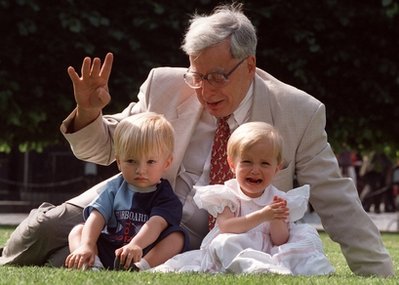Nobel Prize given for test tube baby research
The Nobel Prize in medicine went to a man whose work led to the first test tube baby, an achievement that helped bring 4 million infants into the world and raised challenging new questions about human reproduction.
 |
|
Professor Robert Edwards, the British pioneer of IVF treatment, sits with two of his 'test-tube-babies', Sophie and Jack Emery who celebrate their second birthday in London in this file photo dated Monday July 20, 1998. [Agencies] |
"Today, Robert Edwards' vision is a reality and brings joy to infertile people all over the world," the Nobel Committee said in Stockholm. It began with the birth on July 25, 1978, of the first test-tube baby, Louise Brown, to a couple who had been trying to conceive for nine years.
With in vitro fertilization, or IVF, an egg is removed from a woman, mixed with sperm in a laboratory, allowed to divide for four or five days, then implanted in the womb to grow into a baby. Today the odds of a couple having a baby after a single cycle of IVF treatment are about 1 in 5, roughly the same odds as a fertile couple trying to have children naturally.
Edwards and research partner Patrick Steptoe, who died in 1988, faced opposition to their IVF experiments. Some religious leaders called it morally wrong. Some government officials thought it more important to limit fertility than treat infertility, and some scientists were worried about the safety of embryos.
"In retrospect, it is amazing that Edwards not only was able to respond to the continued criticism of IVF, but that he also remained so persistent and unperturbed in fulfilling his scientific vision," the Nobel Committee said.
Society still wrestles with issues that arose from his work, such as:
? Is it appropriate to obtain stem cells from embryos — embryos created through IVF? Some people object because the embryos are destroyed to get the cells.
? Should women who donate eggs be paid? The Vatican's top bioethics official, Monsignor Ignacio Carrasco de Paula, said Monday that Edwards opened "a new and important chapter in the field of human reproduction." But he also said IVF is responsible for the destruction of embryos and the creation of a "market" in donor eggs.
? Should there be an age limit on women using IVF? In 2006, a 67-year-old Spanish woman made headlines when she gave birth after using the technology to conceive twins. The uproar continued when she herself died only two years later.
 0
0 






